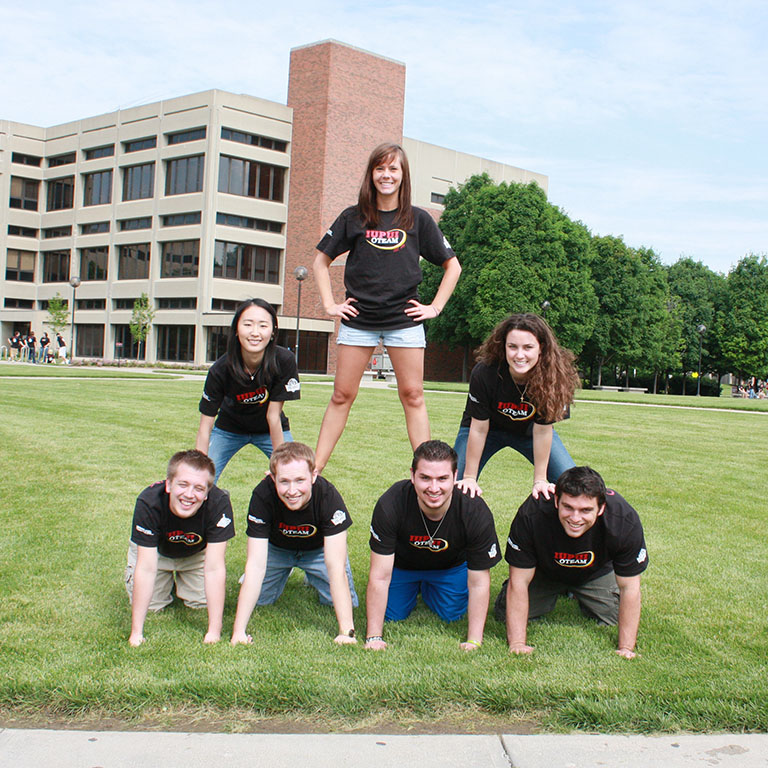
OTEAM: Campus Welcoming Committee
The idea to connect first-year students with peer mentors first emerged in 1997, alongside the creation of University College and first-year seminars. The orientation leader program, now known as OTEAM, was still in its early days of development, and Andrea Engler, the executive director of student transitions and mentor initiatives, was looking for a way to give the student leaders a “more holistic employment experience.”
“We piloted the first-year seminar in 1997,” says Engler, “We then could give orientation leaders a way to continue their role into the academic year.” Having the student leaders present during these transitional seminar courses helped form key connections between students and kept the orientation leaders engaged.
Bepko Learning Center: Academic Support
The development of new mentoring programs also took place at the Bepko Learning Center (Bepko) in 2001 as Mark Minglin, the executive director of academic support programs, sought to expand the center’s available services. Minglin created the tutoring and success coaching components of Bepko, which already housed an academic mentoring service. Each of these three programs are based on a peer-mentor model, they serve different purposes to best fit the needs of students.
Bepko’s mentors in the tutoring component help students who are struggling with specific courses IUPUI offers. Frequently, the mentors are students who have done well in these courses themselves. “We have a list of 82 courses that we are currently targeting,” explains Minglin, “The courses are selected based on the number of students who have received poor grades or withdrawn from them.”
Success coaching is an equally valuable component of Bepko’s work. Minglin says, “Success coaching is for students who have not done well in a semester or need help with goal-setting or time-management skills.” The goal of success coaching is to provide students with the support and resources they need to succeed. Minglin adds, “If a student is struggling with a course outside of our targeted curriculum, we can also match them with a tutor from our network.”
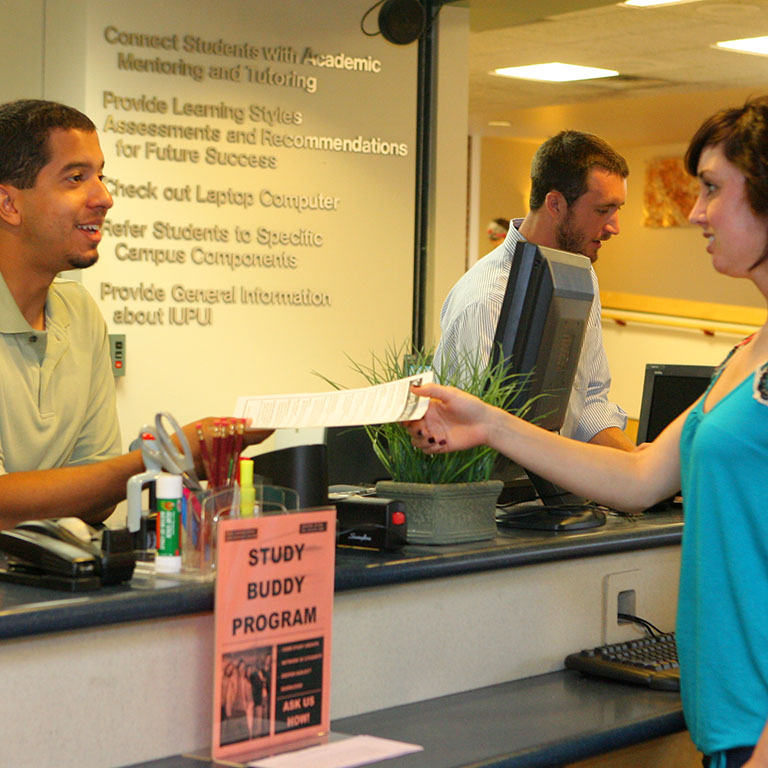

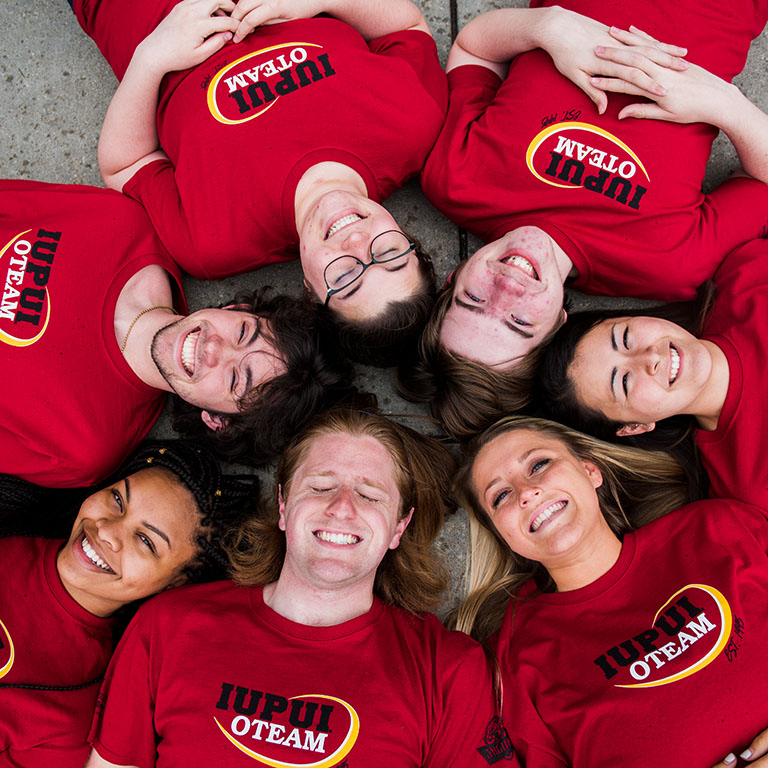
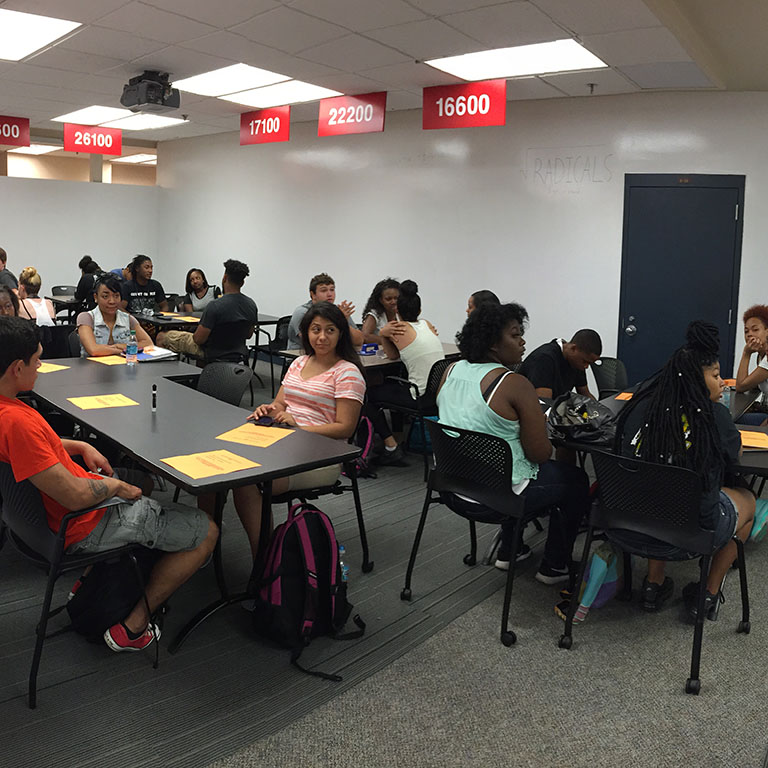
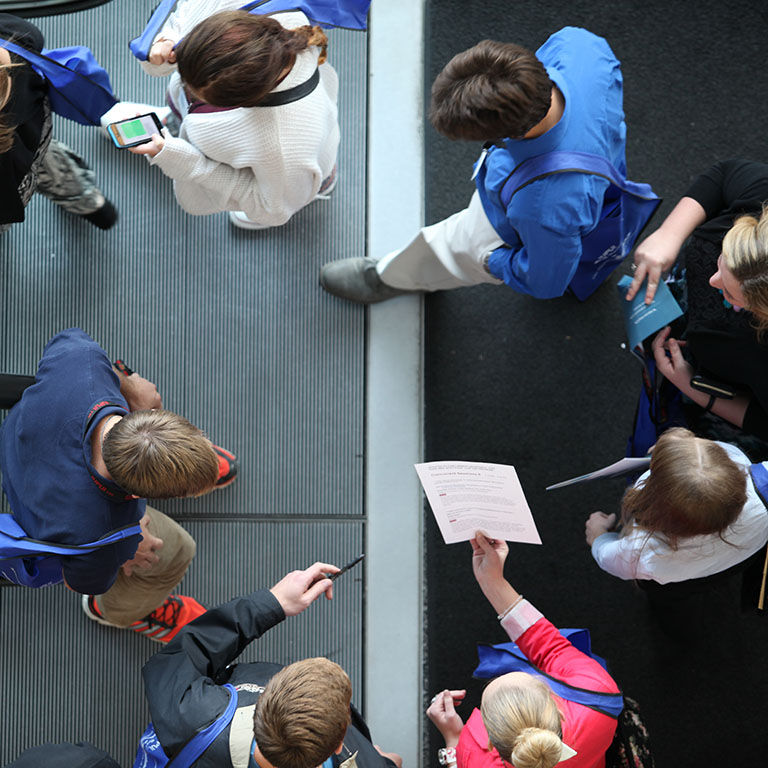

Summer Bridge: Transitional Mentoring
Student success and peer mentoring go hand in hand, as exhibited by the growth of programs like Summer Bridge. In 2001, two faculty members piloted Summer Bridge, designing it as an eight-day program taking place prior to incoming students’ first semester to help them establish a connection to the campus. The same instructional team that leads each first-year seminar also leads Summer Bridge. David Sabol, one of the founding directors of the program, believes mentoring is part of what makes Summer Bridge effective.
“The ability to have students build relationships with peers who are new to college is priceless,” says Sabol, “When we were developing the idea of Summer Bridge, we knew we wanted it to be an extremely active, engaging program. Each mentor’s role is vital in achieving that.”
The Importance of Mentors
The university’s commitment to student success can be seen with other mentoring initiatives around campus. “The programs have grown a lot over a relatively short period of time,” notes David Sabol, “but they have maintained their quality by providing extensive training and support for the students who participate in them.”
For each program on campus that uses peer mentors, the goal of mentor-mentee relationships is multifaceted. Mentors provide support on personal and professional levels for their students by having conversations about their present goals and future aspirations.
Having a mentor drastically changed my life. I likely would not be in college without that guidance. Now, I want to provide that support for my students.
Cody Ellis, First-Year Seminar Mentor
“We get to know each student as an individual,” says first-year seminar mentor Cody Ellis. He experienced the importance of having a mentor firsthand through a different Indianapolis-based program, Starfish Initiative. “Having a mentor drastically changed my life. I likely would not be in college without that guidance. Now, I want to provide that support for my students.”
To continue mentorship development, IUPUI provides a space for those involved with mentoring programs to share their knowledge. This began with the Mentoring Symposium in 2003. Though the symposium began as a mentor development program for a small number of IUPUI students, it has grown into a nationwide event.
“At the most recent symposium, we had over 400 students attend from 18 states,” Mark Minglin affirms, “It is a great place for individuals from other campuses to come together and talk about their experiences with mentoring.”
Mentoring Courses: Developing Mentors
IUPUI’s University College took further steps to expand their mentoring programs in 2004 with four brand new courses dedicated to training student leaders on the best practices for connecting with mentees. The curriculum for these courses includes learning about different leadership styles, communication tactics, building rapport, and the delicate balance of serving as both a peer and role model.
“We were one of a kind in the country to have a program like that,” says Engler, who was part of the team that wrote the curriculum for the courses. Mentors take a different course for four semesters, each building on what they learned in the last. The courses not only provide a traditional learning environment for mentors to hone their skills, but a space where all student leaders across programs can connect.
“You can learn so much from working with other mentors,” says Sydney Kadinger, who has mentored students through the Bepko Learning Center. “You learn other people’s leadership styles and improve your own because of those interactions in class.”
Opportunities for Mentorship
Mentoring programs across IUPUI’s campus have expanded exponentially since the first peer mentors were selected back in 1992. Today, over 300 students serve as mentors throughout many campus programs (eight listed below), and the process of becoming a mentor is highly competitive.
IUPUI Mentor Programs:
- Summer Bridge
- First-Year Seminar (FYS)
- OTEAM
- 21st Century Scholars
- The Mathematics Assistance Center (MAC)
- International Peer Mentoring Program
- The Bepko Learning Center
- Diversity, Enrichment, and Achievement Program (DEAP)
With so many opportunities for mentorship, it’s easy to find one that’s a fit for the individual interests of any student who finds value in guiding other students on the path to success.
For more information, contact the Division of Undergraduate Education Office of Communications at duecomm@iu.edu.

